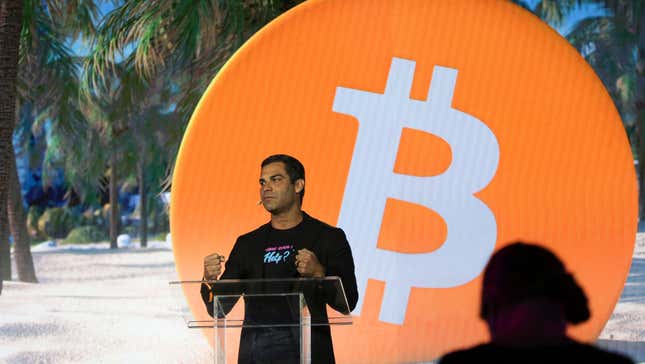
Miami is scheming for ways to become the U.S. bitcoin capital. Mayor Francis Suarez told CNBC last week that his city would welcome bitcoin miners with open arms, as China picks up its nationwide crackdown on miners. What’s more, Suarez also said that the city was looking into lowering energy prices to further entice miners, as well as working to establish enterprise zones with lower tax rates and regulations to tempt bitcoin operations to set up shop.
“We want to make sure that our city has an opportunity to compete,” Suarez said. “We’re talking to a lot of companies and just telling them, ‘Hey, we want you to be here.’ ... We understand how important this is ... miners want to get to a certain kilowatt price per hour. And so we’re working with them on that.”
Suarez is a notorious bitcoin fanboy. He owns both bitcoin and ether, Ethereum’s native cryptocurrency. Earlier this year, he announced that Miami was studying ways to pay its city employees in bitcoin. That’s probably something that may give some workers pause given this week’s cratering prices, but it’s a move that made him popular among crypto fans and got Suarez campaign donations from tech investors. Earlier this month, cryptocurrency exchange FTX officially got a deal approved by the county to sponsor the Miami Heat’s home court arena.
The move fits into Suarez’s larger attempts to make the city a techno-futurist paradise, as he courts various tech entrepreneurs for their business. In one of his most head-scratching moves, Suarez has flirted with Elon Musk’s Boring Company on a plan to build electric vehicle tunnels under the Miami River and through the porous limestone undergirding the city and much of South Florida. Some of these tech fanboy moves have backfired in a big way. Earlier this month, a huge Bitcoin conference held in the city (where Suarez was a keynote speaker) turned out to be a superspreader event. (What else could possibly have been the outcome for a bunch of libertarian crypto bros convening in a state that never had a mask mandate even at the height of the pandemic?)
And there’s a pretty intense irony around building a bitcoin empire in a rapidly drowning city. Bitcoin, which is mined by putting huge computer systems to work solving math problems, is the most energy intensive form of cryptocurrency: The latest estimate from Digiconomist, a site that tracks bitcoin energy use, estimated that the currency uses as much electricity as Argentina, while emitting as much carbon dioxide as Belarus. The city of Miami projected earlier this year that it will have to spend almost $4 billion over the next 40 years just on construction to safeguard parts of the city from sea level rise and to migrate everyone away from the rest.
Suarez touted the city’s use of nuclear power as a reason for its low energy prices. Nuclear is a no-carbon form of energy, but it’s hardly the dominant form of energy in Florida. Natural gas is Florida’s most popular energy source, with the Energy Information Agency noting it accounts for about 75% of the state’s generating capacity. Turkey Point, the main nuclear power plant in South Florida, is actually a hybrid nuclear-gas power plant. The fossil fuel side of the plant generates more energy than the nuclear side.
If Suarez successfully gets miners flocking to his city, there’s no guarantee that they won’t tap into dirty energy in order to power all that new coin. In fact, it would almost certainly lead to the need for more generating capacity. That’s not going to come from bringing new nuclear online, which is a decade-plus process. Nor does it seem like it would come from solar, with local utility Florida Power and Light recently backing off a plan to install more solar capacity.
Huge numbers of miners pouring into other places have spelled big problems for energy supply. Last month, Iran said it would temporarily ban all bitcoin mining in the country after the government said illegal mining operations were tapping a mind-blowing 2 gigawatts of power each day, contributing to rolling blackouts on the already-stressed grid. Miners had set up shop en masse in Iran in recent months, attracted by the country’s low energy prices (in part due to its heavily subsidized oil). The Chinese province of Inner Mongolia also recently banned bitcoin mining to get energy use under control and other places have done the same as well. Let’s hope Miami learns its lessons from them rather than finding out the hard way what happens when crypto mining comes to town.